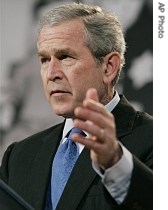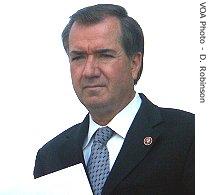2007年VOA标准英语-US Lawmakers Welcome President Bush's Statement(在线收听)
Washington
19 April 2007
U. S. lawmakers are reacting to President Bush's strong statement that the U.S. will tighten financial sanctions against Sudan if Khartoum does not cooperate fully regarding the situation in Darfur. VOA's Dan Robinson reports, the question of how effective sanctions can be in forcing governments to change their behavior was also a topic in a congressional hearing Wednesday.
 |
| President Bush speaks at the US Holocaust Memorial Museum in Washington 18 April 2007 |
"First, the Department of the Treasury will tighten U.S. economic sanctions on Sudan. This new effort will allow the United States to enforce more aggressively existing sanctions against Sudan's government, by blocking any of its dollar transactions within the U.S. financial system. As part of this effort, the Treasury Department will add 29 companies owned or controlled by the government of Sudan to its list of Specially Designated Nationals. This designation will bar these companies from the U.S. financial system -- and make it a crime for American companies and individuals to willfully do business with them," he said.
In addition, the president says the U.S. would target sanctions against individuals responsible for violence in Darfur, measures he says would cut them off from the U.S. financial system and prevent them from doing business with any American citizen or company.
A few hours later, a House subcommittee on terrorism, trade and nonproliferation convened a hearing to examine the question of how effective sanctions can be.
"In looking at the objectives we are trying to achieve, it is to turn to those proliferating and terrorist countries and limit or eliminate loans to their government, investments in their oil sector, all the other investments, and their non-energy exports," he said.
 |
| Congressman Ed Royce of California |
However, Royce says he would like to have seen stronger steps from the president. "I am disappointed that the president did not go farther this morning, during his Sudan speech, and give [the U.S. Treasury Department] the green light to cut off Sudan's dollar transactions with the U.S. financial system. We have waited long enough. I have been to Darfur, I have been to camps that have been attacked [and] talked to survivors. Genocide is indeed occurring there. It is time for the U.S. to take this kind of decisive action," he said.
In other reaction, the ranking Republican on the House Foreign Affairs Committee, Congresswoman Ileana Ros-Lehtinen, who recently visited Sudan as part of a small congressional delegation said the president delivered a clear message that half measures and disingenuous gestures by authorities in Khartoum will no longer be tolerated.
Wednesday's hearing focused primarily on the impact of sanctions on Iran and North Korea, along with some mention of Syria and Cuba.
Sanctions are most effective, U.S. officials told lawmakers, when they are part of a multilateral financial and diplomatic strategy. "Targeted or calibrated sanctions make it clear that we are not taking aim, for example, at innocent civilian populations but rather at those individuals or entities who are specifically responsible for the dangerous behavior of a particular regimem," said Paul Simons, Deputy Assistant Secretary of State for Economic, Energy and Business Affairs.
Adam Szubin is Director of the Office of Foreign Assets Control at the U.S. Department of the Treasury. "By moving in tandem with rather than against the natural inclinations of the private sector, our sanctions have resonated across the international financial sphere, delivering a widespread and tangible impact," he said.
Where Sudan is concerned, legislation moving through the House would require the U.S. Securities and Exchange Commission to compile a list of all companies on the New York Stock Exchange with ties to Khartoum, and prohibit them from receiving federal contracts, and make it legal for U.S. states to divest from such companies.
Sarah Steelman, treasurer for the state of Missouri, spoke in favor of such legislation. "A recent poll conducted for the Center for Security Policy showed that more than 80 percent of those surveyed say that if they learned that a company in which they have invested was found to be doing business in a state sponsor of terrorism, like Iran, Syria or Sudan, they would either sell that investment or demand the company cease doing business with the terror supporting nation," he said.
Roger Robinson, President and Chief Executive Officer of the Conflict Securities Advisory Group, says the impact of divestment efforts on regimes, especially by companies involved in the energy sector, would be significant.
He asserts there is wide support in the U.S. for terror-free, or in the case of Sudan, genocide free investment. "There is no question therefore that given a choice, American investors would prefer to avoid doing business with companies that have those types of material business arrangements with these regimes," he said.
Lawmakers, meanwhile, are stepping up their own personal and diplomatic efforts regarding Darfur.
Against the background of ongoing efforts by the Congressional Black Caucus, House majority leader Steny Hoyer recently went to Sudan, meeting with southern government leaders, visiting displaced persons camps in Darfur, and assessing African Union peacekeeping efforts.
Hoyer also used a meeting with Egyptian President Mubarak in Cairo to urge stronger diplomatic pressure on Khartoum, and said Egypt's ambassador in Washington telephoned him to say President Mubarak had followed through with a pledge to act, although it is not clear exactly what form that took.